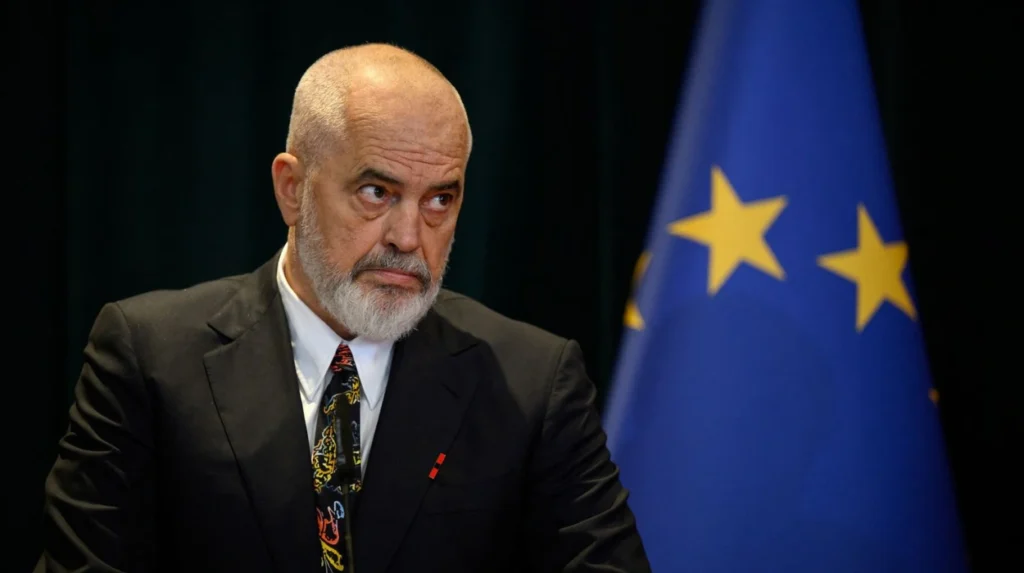In an unprecedented move that has drawn global attention, Albanian Prime Minister Edi Rama announced the appointment of an AI-generated “minister” within his government to spearhead the country’s fight against corruption. The prime minister revealed the decision during a televised press conference in Tirana, describing the digital appointment as a “necessary and bold step” to break entrenched cycles of political patronage and address institutional inefficiencies.
Edi Rama told reporters,
“Corruption has been the greatest enemy of progress in Albania for decades. It has weakened trust, diverted resources, and unfairly punished ordinary citizens. This is why we have decided to do something no other government in the world has done—to create an incorruptible, unbiased, data-driven minister powered by artificial intelligence.”
The AI-generated figure, referred to by government officials simply as “Minister AI,” will not replace any existing cabinet member but will exist as an autonomous advisory entity embedded into the decision-making process. The government described the role as both symbolic and functional, positioning it as a deterrent against corruption in public procurement, judiciary monitoring, and oversight of government contracts.
The Role of Albania’s AI Minister
According to official statements, the AI minister has been designed using advanced machine learning models trained on decades of financial, judicial, and administrative data. The government emphasized its ability to cross-check contracts, monitor public spending, and flag suspicious transactions in real time.
Justice Minister Ulsi Manja elaborated on how the AI will be involved in day-to-day processes, saying,
“This system can scan millions of records in seconds, identifying patterns that humans might miss—or ignore. It will be integrated into procurement oversight and budget committees, where transparency is most needed.”
Officials noted that Minister AI will have access to all government tenders, procurement platforms, and the databases of state-owned enterprises. While the digital minister does not possess voting rights in cabinet meetings, it will provide non-negotiable red-flag reports that must be reviewed by independent anti-corruption bodies.
A Country Battling Longstanding Corruption
Albania has struggled for years with high-profile corruption scandals, from rigged procurement deals to allegations of judicial corruption. Transparency International consistently ranks Albania among the more challenged European countries regarding corruption perception, making reform efforts a significant test for the Balkan state that has been negotiating its path toward eventual EU membership.
Political analyst Ardit Gjini told local media,
“This move reflects both desperation and innovation. Desperation because human-led reforms have repeatedly failed, and innovation because the government is willing to test radical approaches. Whether this experiment works will depend on how immune to political influence the AI minister really is.”
Despite recent reforms and EU pressure, several sectors remain highly vulnerable to graft, including construction permits, privatization tenders, and judiciary independence. Critics argue that while technological safeguards are welcome, systemic cultural changes are harder to enforce, raising questions about how much impact an AI-generated role can truly have.
Global Reactions to Albania’s Bold Experiment
The announcement immediately captured international interest, sparking debates in foreign press outlets and among governance experts. The European Commission issued a cautious but supportive statement, noting,
“We closely follow Albania’s efforts in the rule of law and anti-corruption. Innovation in governance is welcome, provided it strengthens transparency and accountability in line with European standards.”
Meanwhile, international anti-corruption watchdogs were more divided. A researcher from Transparency International stated to Balkan outlets that “technology can be an important ally against corruption, but only if the political class doesn’t manipulate its design. The main concern is whether Albania’s AI minister will truly operate without interference.”
From outside Europe, the World Bank’s Governance Global Practice unit called the initiative “pioneering” but stressed the importance of accountability. Their statement read, “Algorithmic oversight can reduce corruption, but it must not replace independent human institutions. AI can detect, but humans must act on those detections.”
Public Reaction in Albania
Within Albania, public response has been deeply mixed. Some citizens expressed optimism that artificial intelligence might break through political stalemates where human leaders have failed. Social media platforms quickly filled with memes portraying the AI minister as an incorruptible robot standing against corrupt elites.
An engineering student in Tirana told local television,
“We’ve had too many promises and too little change. If an AI can be honest and point out corruption, then it already sounds better than most politicians.”
Others expressed skepticism, particularly about transparency surrounding the AI’s design and data sources. One trade union representative was quoted saying,
“We do not want corruption replaced with technocracy. Who checks the algorithm? How do we know private companies designing this tool are not manipulating it to serve their own interests?”
Concerns Over Accountability and Privacy
Legal experts have raised serious concerns about the initiative’s implications for privacy and accountability. Since the AI minister will have access to sensitive government and financial data, questions remain over safeguards against misuse of information. Privacy International issued a warning that “granting AI systems access to such vast datasets carries significant risks, particularly in a state with weaker democratic institutions and oversight frameworks.”
Moreover, opposition politicians within Albania argued the government is using the AI announcement as a “spectacle” to distract from ongoing corruption trials. Opposition MP Jorida Tabaku said during a parliamentary session,
“The government wants to use artificial intelligence as camouflage for real accountability. Who programmed this minister? Who supervises it? Without human honesty, machines cannot save us.”
Balancing Innovation with Skepticism
Despite criticism, Prime Minister Rama defended the move, claiming Albania had little choice but to innovate. He argued that by integrating AI into governance, the country demonstrates both to its citizens and to Brussels that it is willing to embrace transparency.
Rama reinforced his optimism during follow-up interviews, stating,
“The AI minister cannot be bribed. It cannot be intimidated. It cannot be influenced by political careers. For the first time, we have a tool that looks only at facts and numbers.”
Digital governance experts have pointed out, however, that artificial intelligence is not inherently free of bias. Algorithms are shaped by their training data and by the institutions that build them. Dr. Marinela Kodra, a political technologist at the University of Tirana, remarked, “If the training data reflects decades of biased decisions, the AI’s conclusions may reproduce those same inequalities. It is not corruption-proof, but it is surveillance-proof.”
What Comes Next for ‘Minister AI’
The government has announced that the AI minister will undergo a six-month pilot phase, after which a joint parliamentary committee will evaluate its performance. If successful, officials say its role will expand to include monitoring local municipalities, electoral financing, and public-private partnership contracts.
A government spokesperson hinted the AI system could later be expanded into a digital ombudsman role, open to direct citizen complaints. Under such a system, citizens could anonymously report suspected corruption cases to the AI entity, which would then forward validated findings to the prosecution.
A Lesson for Other Nations
Albania’s AI minister experiment has already influenced debate in neighboring countries. In North Macedonia, some MPs have proposed exploring similar tools to monitor procurement, while in Serbia, opposition parties mocked Albania’s move as “science fiction politics.” Analysts believe the pilot phase will serve as an international reference point for whether AI can seriously disrupt corruption networks or whether it is merely a symbolic experiment.
Professor Daniel Kaufmann, a well-known governance expert formerly with the World Bank Institute, explained in a commentary that “Albania is attempting to leapfrog decades of failed reform with a technological shock. Success would place Albania on the world stage as a governance innovator. Failure will reinforce cynicism that corruption cannot be tackled without genuine political will.”
Albania’s decision to appoint an AI-generated minister marks a world first—a dramatic intersection of technology and governance reform. It reflects both the urgency of Albania’s corruption crisis and an ambitious willingness to test unconventional solutions. Whether “Minister AI” proves to be a turning point in the country’s democratic evolution or a short-lived experiment will depend on its effectiveness, transparency, and the government’s willingness to let a machine help hold human power accountable.







